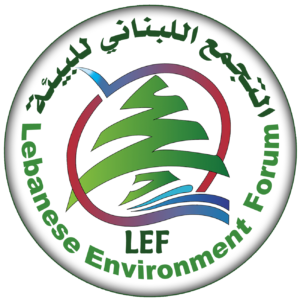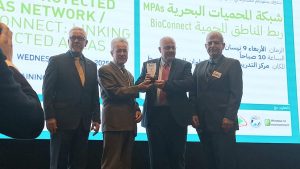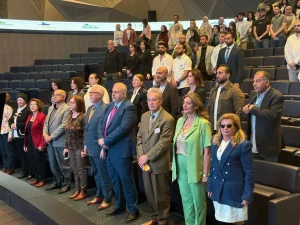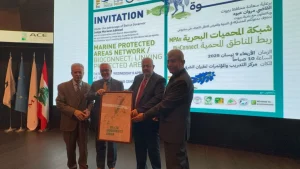The Lebanese Environment Forum (LEF) organized its 9th traveling exhibition in Beirut, in collaboration with the Society for the Protection of Nature in Lebanon (SPNL), under the esteemed patronage of H.E. Judge Marwan Abboud, Governor of Beirut, and in cooperation with Beirut Municipality.
The high-level environmental event occurred on Wednesday, April 9, 2025, at the Middle East Airlines Training Center in Beirut. It promoted two ambitious EU-funded biodiversity projects and signed a strategic Memorandum of Understanding (MoU) between Lebanon’s leading environmental organizations.
Promotion of Two EU-Funded Biodiversity Projects
Organized by LEF and SPNL, the seminar and traveling exhibition introduced two major initiatives funded by the European Union:
-
“Conducting an Evidence-Based National Non-State Actors Campaign for a Marine Protected Areas Network in Lebanon” – implemented by LEF in partnership with the University of Balamand.
-
“BIOCONNECT: Ensuring Effective Management and Governance in Sites of Ecological Importance and Expanding Biodiversity Protection in Southern Lebanon” – led by the Al Shouf Cedar Society (ACS), in collaboration with SPNL, the Association for Community and Environment (ACE), and the Association for the Development of Rural Capacities (ADR).
Governor of Beirut Announces Commitment to Establish Hima Marine Reserve at Ramlet al-Baida
In a historic keynote address, Governor Marwan Abboud renewed his commitment of the Beirut Governorate to protect the city’s coastline by establishing a Hima Marine Reserve at Ramlet al-Baida beach—Beirut’s last remaining public shoreline.
This designation will be integrated into the national Marine Protected Areas (MPA) Network, contributing directly to Lebanon’s international environmental commitments, including the 30×30 target under the Convention on Biological Diversity (CBD).
LEF President Calls for Unity and Science in Marine Conservation
During his speech and presentation, Eng. Malek Ghandour, President of LEF, emphasized the urgency of protecting Lebanon’s marine ecosystems:
“Our marine ecosystems are under increasing pressure and face serious degradation. Lebanon has declared three marine protected areas, yet they cover only 0.41% of our waters—far from the global goal of 30% by 2030.
SPNL Director General Highlights Hima as a Path to Peace and Protection
Mr. Assad Serhal, Director General of SPNL, delivered an inspiring speech and presentation reflecting the organization’s grassroots and holistic approach to conservation:
“At SPNL, we believe in connecting people to nature through the time-honored Hima approach. From just two ‘Hima for Peace’ villages, we’ve grown to eight vibrant communities committed to sustainability, peace, and tradition.
Over 4,500 students have been empowered through our ‘School With No Walls’ program, and more than 6,500 visitors have explored our ‘Droub Al Hima’ trails—bringing nature education to life.
We’re empowering artisans through Souk Al Hima and supporting farmers through Hima Farms. Our Anti-Poaching Unit is on the ground, protecting Lebanon’s wildlife every day.
All this contributes to a shared national vision: protecting 30% of our land and sea by 2030. The Upper Beirut River Valley Natural Park is a major step in that direction. Together with our partners, we are turning vision into action—uniting conservation, livelihoods, and peace.”
MoU Signing: A New Era of Environmental Collaboration
The event was crowned by the signing of a strategic Memorandum of Understanding (MoU) between LEF and SPNL, represented by Eng. Malek Ghandour and Mr. Assad Serhal.
The MoU outlines a six-year partnership to:
-
Expand and connect protected areas and biodiversity corridors;
-
Increase the number of Hima and IBBA sites to cover 8% of Lebanon’s land and marine territory by 2030;
-
Combat illegal hunting, poaching, and unsustainable fishing practices;
-
Empower local communities through education, eco-tourism, and sustainable agriculture;
-
Align conservation work with Lebanon’s Biodiversity Strategy and international obligations.
A joint implementation committee will be established to monitor progress, mobilize resources, and engage national stakeholders including ministries, municipalities, and law enforcement.
Updates and Presentations
Rebecca Baissari Presents MPA Network Progress
Environmental specialist Eng. Rebecca Baissari presented an update on the Marine Protected Areas (MPA) Network in Lebanon, outlining current achievements, challenges, and next steps. Her presentation emphasized the importance of:
-
Strengthening institutional frameworks for marine conservation;
-
Scaling up the number and effective management of marine protected areas;
-
Fostering collaboration between government, academia, civil society, and coastal communities;
-
Highlighting Ramlet al-Baida as a key candidate for protection due to its ecological and social significance.
Introduction of SWIM: Sustainable Waste Intercity Marathon
Adding an innovative and energetic component to the event, Lisa Sofian introduced a new NGO initiative: SWIM – Sustainable Waste Intercity Marathon.
This dynamic environmental campaign uses sports and public participation to raise awareness about waste management and sustainable living across Lebanon’s cities.
SWIM is envisioned as a nationwide, eco-focused marathon connecting municipalities, citizens, and youth in an effort to promote behavioral change, reduce urban waste, and build momentum for climate-friendly lifestyles.
Clara Khoury Presents the Work of The Coastal Forum
Clara Khoury, representing The Coastal Forum (منتدى الساحل), took the stage to present the Forum’s ongoing efforts to protect Lebanon’s coastline and promote sustainable coastal governance. She showcased:
-
Community engagement initiatives along the Lebanese coast;
-
Collaborative projects with local municipalities to prevent coastal erosion and pollution;
-
Advocacy for public access to natural beaches;
-
The Forum’s role in shaping marine and coastal policy through dialogue between civil society, scientists, and decision-makers.
Clara emphasized the Forum’s mission to serve as a platform for inclusive coastal stewardship, working hand-in-hand with partners like LEF, SPNL, and local authorities to preserve the natural and cultural identity of Lebanon’s coastline.
Lina Sarkis Presents Progress on BIOCONNECT
Representing the Al Shouf Cedar Society (ACS), Lina Sarkis delivered a focused update on the BIOCONNECT project, highlighting its achievements in:
-
Promoting ecological connectivity;
-
Strengthening local governance of protected sites;
-
Integrating conservation with community development in southern Lebanon.
Her presentation covered:
-
Efforts to enhance the management of Sites of Ecological Importance (SEIs) through capacity building and participatory planning;
-
Initiatives to engage local stakeholders—including women, youth, and farmers—in conservation efforts;
-
Ongoing work to expand protected areas, restore degraded ecosystems, and preserve biodiversity hotspots;
-
The role of BIOCONNECT in aligning with national biodiversity goals and Lebanon’s commitments under the 30×30 conservation target.
Bassima Khatib Presents Progress From IBBAs to Himas and Natural Parks
Bassima Khatib, representing the Society for the Protection of Nature in Lebanon (SPNL), delivered a compelling presentation highlighting the organization’s journey from identifying Important Bird and Biodiversity Areas (IBBAs) to establishing a network of community-led conservation sites known as Himas.
Emphasizing the importance of merging scientific research with traditional knowledge, Khatib showcased how SPNL revived the ancient Hima approach to sustainably manage natural resources, empower local communities, and bridge the gap between biodiversity protection and cultural heritage.
Her presentation also outlined SPNL’s efforts to link these Himas into eco-touristic and peacebuilding networks, contributing to Lebanon’s natural park system and advancing the country’s protected area coverage in line with global biodiversity goals.




